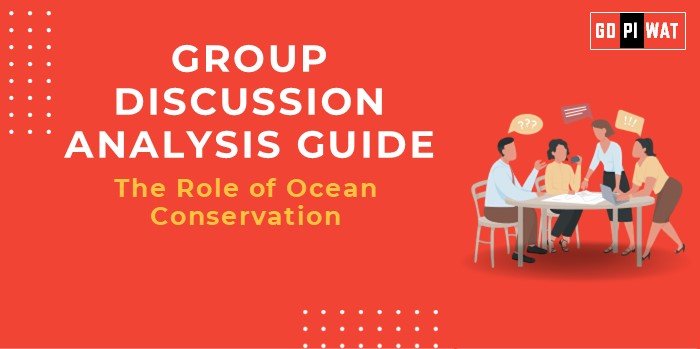🌊 Group Discussion (GD) Analysis Guide: The Role of Ocean Conservation
📚 Introduction to the Topic
Context: Oceans cover over 70% of the Earth’s surface and are essential for climate regulation, biodiversity, and human livelihoods. Yet, pollution, overfishing, and climate change threaten their health. With environmental disasters like marine oil spills and coral bleaching, the question of prioritizing ocean conservation gains critical importance for sustainable development.
Background: The United Nations declared 2021–2030 as the Decade of Ocean Science for Sustainable Development, emphasizing the need for collective global action. Ocean conservation is not just an environmental concern but also a socio-economic necessity.
📊 Quick Facts and Key Statistics
- Plastic Pollution: 11 million metric tons of plastic enter the oceans annually, projected to triple by 2040 (UNEP).
- Biodiversity: Oceans house 80% of Earth’s biodiversity, critical for ecological balance.
- Carbon Absorption: Oceans absorb 30% of CO₂ emissions, mitigating climate change.
- Economic Contribution: Ocean-based industries contribute $2.5 trillion annually to the global economy (OECD).
- Fisheries Dependence: 3 billion people rely on marine fisheries for sustenance.
👥 Stakeholders and Their Roles
- Governments: Formulate and enforce marine protection laws, allocate budgets for conservation.
- International Organizations: UN, World Bank, and others lead global frameworks like the Sustainable Development Goals (SDG 14 – Life Below Water).
- Private Sector: Innovate in sustainable fishing, alternative packaging, and clean energy.
- NGOs and Communities: Advocate for policies, execute ground-level interventions, and raise awareness.
- Academia and Scientists: Provide research and technological solutions for sustainable practices.
🏆 Achievements and Challenges
🌟 Achievements
- Marine Protected Areas (MPAs): Over 7% of oceans are MPAs, showing improved biodiversity in regions like the Great Barrier Reef.
- Cleaner Oceans Initiatives: Programs like “The Ocean Cleanup” have removed tons of plastic debris.
- Climate Pacts: The Paris Agreement indirectly contributes to ocean health by targeting climate change.
⚠️ Challenges
- Overfishing: 33% of fish stocks are overfished, with dire consequences for marine ecosystems.
- Marine Pollution: Oil spills and untreated sewage continue to degrade ocean health.
- Global Comparison: Countries like Norway lead in sustainable fishing, while regions like Southeast Asia face severe challenges in managing plastic waste.
📋 Structured Arguments for Discussion
- Supporting Stance: “Focusing on ocean conservation is essential to avert ecological disasters and sustain livelihoods tied to marine resources.”
- Opposing Stance: “Resources should be prioritized for immediate land-based environmental concerns like deforestation and air pollution.”
- Balanced Perspective: “Ocean conservation must go hand-in-hand with terrestrial environmental efforts to ensure holistic ecological stability.”
💡 Effective Discussion Approaches
- Opening Approaches:
- Statistical Hook: “With 30% of CO₂ emissions absorbed by oceans, neglecting their health exacerbates global warming.”
- Case Study Highlight: “The Deepwater Horizon oil spill showed how unregulated ocean activities can lead to catastrophic environmental and economic impacts.”
- Comparative Lens: “While Norway excels in sustainable marine practices, countries with large coastlines often lag behind due to governance and resource issues.”
- Counter-Argument Handling:
- Acknowledge global economic pressures.
- Provide data on successful ocean-based renewable projects.
- Emphasize the interconnectedness of ecosystems.
🔍 Strategic Analysis of Strengths and Weaknesses
- Strengths: High biodiversity, economic potential of blue economy.
- Weaknesses: Limited international cooperation, enforcement issues.
- Opportunities: Ocean-based renewable energy, eco-tourism.
- Threats: Climate change, geopolitical conflicts over maritime zones.
🔗 Connecting with B-School Applications
- Real-World Applications: Sustainability in ocean industries can inspire B-school projects on CSR, logistics, and operations.
- Sample Interview Questions:
- “How can businesses balance profit and marine conservation?”
- “What role do international laws play in safeguarding oceans?”
- Insights for Students:
- Explore marine industry trends for entrepreneurship or consulting roles, e.g., green shipping.
- Analyze the blue economy’s potential for sustainable growth.


